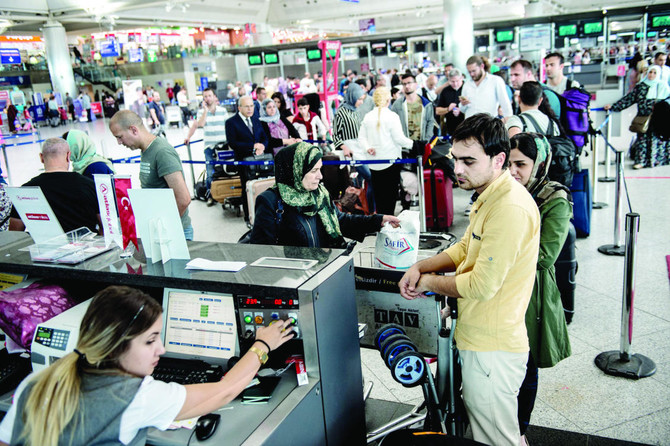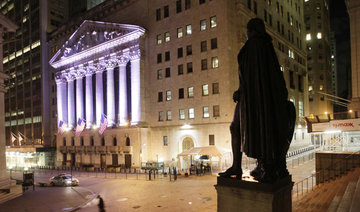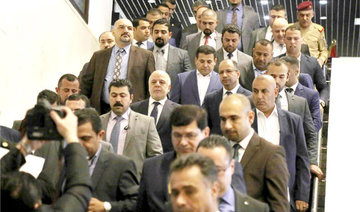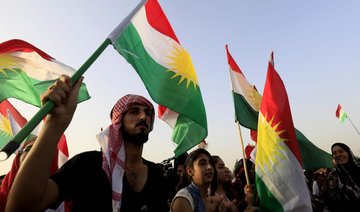ANKARA: Iraq has suspended all international flights to and from Iraqi Kurdistan’s capital Irbil from Friday, as Baghdad cranked up the pressure on the Kurds over their independence referendum last Monday.
The cut in foreign air links, Baghdad’s first retaliatory measure against the referendum — in which 92 percent voted for independence from Iraq — was condemned on Thursday by the Kurdistan Regional Government (KRG) as “collective punishment against the Kurds.”
Irbil Airport Director Talar Faiq Salih said all international flights to and from the city would stop from 6 p.m. (1500 GMT) on Friday, following a decision by the Iraqi Cabinet.
Thursday’s decision saw people, many of them foreigners, turn out in droves at Irbil Airport to avoid getting stuck in the autonomous Kurdish region of northern Iraq.
Measures adopted by Baghdad in the wake of the referendum “are illegal and unconstitutional… They deny the constitutional rights of the Kurds,” the KRG said, adding that it was “ready for dialogue to resolve problems” with Baghdad.
Since the referendum, Turkey — which has called it “illegitimate” — has been coordinating countermeasures with Baghdad.
The office of Iraqi Prime Minister Haider Al-Abadi on Thursday said Ankara agreed to deal only with Baghdad regarding crude oil exports.
Turkish Prime Minister Binali Yildirim on Thursday said Ankara, Tehran and Baghdad will soon hold a trilateral summit to coordinate measures against the KRG.
The Turkish and Iraqi armies have been conducting joint drills along their border since Sunday evening.
On Wednesday, the Turkish Foreign Ministry issued a second travel warning against Irbil, Dohuk and Sulaimaniyah provinces of Iraq due to potential security risks.
On the same day, Ankara held a high-level security summit over recent developments in northern Iraq and Syria, presided by President Recep Tayyip Erdogan.
In line with the Iraqi Civil Aviation Authority’s decision to execute an air embargo and suspend international flights, Turkey’s leading airlines — Turkish Airlines, AtlasGlobal and Pegasus — are to suspend flights to northern Iraq as of Friday until further notice.
Erdogan on Thursday said KRG President Masoud Barzani has “thrown himself into the fire” by holding the referendum.
Mehmet Akif Okur, a Middle East expert from Yildiz Technical University in Istanbul, said Ankara’s measures aim to show the KRG that any declaration of independence will have a cost.
“Although he has close relations with Ankara, Barzani didn’t negotiate with Turkish authorities before taking such a crucial decision as the referendum,” Okur told Arab News.
“Now Ankara wants to warn the KRG that any independence declaration might result in more serious consequences.”
On Thursday, Turkey said it had begun preparations to open a new border crossing in Ovakoy near the border with Iraq, as an alternative to the Habur crossing with the KRG.
“Trade revenue from Ovakoy will be taken by Baghdad. It’ll be an economic sanction on the KRG because Habur was the primary door for it to trade with the world,” Okur said.
“But sanctions should bear in mind that we have historical and cultural ties with northern Iraq. Humanitarian concerns should be taken into consideration.”
Galip Dalay, research director at Al-Sharq Forum in Istanbul, said Turkey should keep channels open with both Baghdad and the KRG.
“It shouldn’t burn bridges with the Iraqi Kurds,” he told Arab News. “In the end, Iraqi Kurds and the central government will sit down for talks.”
Dalay said some of the rhetoric from Baghdad is mostly meant for domestic consumption. “Elections are taking place in April, and there’s fierce rivalry between different groups and personalities within the Iraqi Shiite political establishment. This creates fertile ground for unfruitful discourse, but it’s untenable,” he said.
So Turkey should not be party to Iraqi internal politics, and should not adopt sanctions against the KRG, he added.
“Previous cases show that sanctions aren’t that effective as a foreign policy tool. Saddam Hussein’s sanctions against the Kurds in 1992 proved to be counterproductive for his regime, and paved the way for the Kurdish state-building process,” Dalay said.
“In Iraq, there aren’t just two options: Separation or the status quo. There are other options too, such as a confederation. Turkey should invest time and energy into such viable options.”
Iraq imposes flight ban on Irbil
Iraq imposes flight ban on Irbil

Kurdish fighters in Syria face dual threats

- Suppressed for decades, the Kurds took advantage of the weakness of Bashar Assad’s government during the civil war
- But with the rise of the new authority following his ouster, they are left navigating a complex and uncertain future
BEIRUT: Kurdish fighters in northern Syria are increasingly under pressure from Turkish-backed armed groups while also fearing the new authorities in Damascus will upend their hard-won autonomy.
Suppressed for decades, the Kurds took advantage of the weakness of Bashar Assad’s government during the civil war, but with the rise of the new authority following his ouster, they are left navigating a complex and uncertain future.
As Islamist-led militants pressed their lightning 12-day offensive that toppled Assad on December 8, Turkish-backed fighters began a parallel operation against Kurdish-led forces in the north.
They quickly seized Tal Rifaat and Manbij, two key Kurdish-held areas in a 30-kilometer (17-mile) stretch along the Turkish border where Ankara wants to establish a so-called “security zone.”
Following a wave of fighting, a US-brokered truce took hold on December 11, although Kurdish forces say it has not been respected by Turkish forces in the area nor their proxies.
Kurdish fighters make up the bulk of the US-backed Syrian Democratic Forces (SDF) which was formed in 2015 and is seen as the Kurds’ de facto army.
The SDF spearheaded the fight that defeated Daesh group militants in Syria in 2019 and is still seen by the US as a “crucial” to prevent a militant resurgence in the area.
They have warned about a possible Turkish assault on the Kurdish-held border town of Kobani, also known as Ain Al-Arab, which has become a symbol of the fight against IS.
On Tuesday, SDF leader Mazloum Abdi proposed setting up a “demilitarized zone” in Kobani under US supervision.
There are also US troops in Syria as part of an international coalition against the militants, whose numbers doubled earlier this year to around 2,000, the Pentagon said Thursday.
As well as relying on pro-Turkish fighters, Ankara has between 16,000 to 18,000 troops in northern Syria, Turkish officials say, indicating they are ready for deployment “east of the Euphrates” if Kurdish fighters don’t disarm.
But Turkiye’s top diplomat Hakan Fidan on Wednesday said there would be no need for Ankara to intervene if the new government was to “address this issue properly.”
Observers say Ankara wants to take advantage of the Syrian upheaval to push Kurdish forces away from the border zone, seeing them as “terrorists” over their ties with the PKK which has fought a decades-long insurgency on Turkish soil.
Since 2016, the Turkish military has launched several operations in northern Syria targeting the YPG (the People’s Protection Units), which makes up the bulk of the SDF.
Turkish troops have remained in a large stretch of land on the Syrian side of the border.
Syria’s Kurds have made several gestures of openness toward the new authorities in Damascus, fearing for the future of their autonomous region.
They have adopted three-starred independence flag used by the opposition that is now flying over Damascus, and said Wednesday they were canceling customs and other taxes on goods moving between their area and the rest of Syria.
HTS’ military chief Murhaf Abu Qasra, whose nom de guerre is Abu Hassan Al-Hamawi, said Tuesday Kurdish-held areas would be integrated under the new leadership because Syria “will not be divided.”
“The region currently controlled by the SDF will be integrated into the new administration of the country,” he said.
WFP says three staff killed in aerial bombardment in Sudan

ROME: The UN’s World Food Programme (WFP) said Friday that three of its staff had been killed in an “aerial bombardment” in Sudan the previous day.
“WFP is outraged by the killing of three of its staff members in an aerial bombardment in Sudan on December 19, 2024,” the agency said in a statement on X.
“A WFP field office was hit during the attack. We are gathering more information and will provide updates as we learn more.”
A spokesman was unable to give more details when contacted by AFP.
War has raged since April 2023 between the Sudanese army under de facto ruler Abdel Fattah Al-Burhan and the paramilitary Rapid Support Forces (RSF) led by his former deputy, Mohamed Hamdan Dagalo.
The WFP on Thursday warned that Sudan risks becoming the world’s largest hunger crisis in recent history, with 1.7 million people across the country either facing famine or at risk of famine.
Turkiye will support Syria’s reconstruction, improve cooperation

- Turkish president says to intensify trade relations with Syria and Iraq ‘to bring new dynamism for both Syria and Turkiye in every respect’
ANKARA: Turkiye will do whatever necessary for the reconstruction of Syria following the ouster of Bashar Assad, including improving ties in trade, energy and defense, President Tayyip Erdogan said.
“We will intensify our trade relations with Syria and Iraq. This will bring new dynamism for both Syria and Turkiye in every respect,” Erdogan said, according to a transcript of remarks he made to journalists on his return flight from Egypt.
“We will collaborate in many areas, from defense to education and energy. Syria currently faces serious energy issues. But we will swiftly address all of these problems.”
Palestinian officials accuse Israeli settlers of mosque arson in West Bank

- Attack targeted the Bir Al-Walidain mosque in the village of Marda
- Settlers also vandalized the mosque’s walls with “racist graffiti” in Hebrew
NABLUS: Palestinian officials reported on Friday that Israeli settlers had set fire to a mosque in the occupied West Bank, an act Israeli police said was under investigation.
According to Abdallah Kamil, the governor of Salfit, the attack targeted the Bir Al-Walidain mosque in the village of Marda.
“A group of settlers carried out an attack early this morning by setting fire to the mosque,” Kamil said in a statement.
In addition to the arson, the settlers vandalized the mosque’s walls with “racist graffiti” in Hebrew, he said.
Photographs shared on social media showed slogans spray-painted in black including “Death to Arabs.”
Villagers of Marda confirmed the details, with one resident telling AFP: “They set fire to the entrance of the mosque and wrote Hebrew slogans on its walls.”
Another resident said the fire was extinguished before it could engulf the entire structure.
An AFP photographer at the scene saw villagers gathering at the mosque to assess the extent of the damage.
Governor Kamil alleged that settlers had previously entered the village “under the protection of the Israeli army,” and that similar acts of vandalism and graffiti had been reported in nearby areas.
The Palestinian foreign ministry in Ramallah condemned the incident, calling it a “blatant act of racism” and a reflection of the ” widespread incitement campaigns against our people carried out by elements of the extremist right-wing ruling government” of Israel.
Israeli police and the domestic Shin Bet security agency described the incident as a matter of “great severity.”
They said they would “act decisively to ensure accountability for those responsible,” adding an investigation was underway, with authorities gathering testimony and evidence from the scene.
Violence in the Israeli-occupied West Bank has intensified since the war in Gaza began on October 7 last year following Hamas’s attack on Israel.
Since the start of the war, at least 803 Palestinians have been killed in the West Bank by Israeli forces or settlers, according to the Palestinian health ministry.
In the same period, Palestinian attacks have claimed the lives of at least 24 Israelis in the West Bank, based on Israeli official data.
Israel has occupied the West Bank since the 1967 Arab-Israeli war.
US diplomats meet representatives of Syria's Hayat Tahrir Al-Sham in Damascus

- First US officials to visit Syria since the fall of Assad
- State department says diplomat discussed 'transition principles endorsed by the US'
WASHINGTON/DAMASCUS: US diplomats visiting Damascus held Washington’s first in-person official meetings with Syria’s new de facto rulers led by Hayat Tahrir Al-Sham on Friday and discussed with the former Al-Qaeda affiliate the future of Syria’s political transition.
The United States, other Western powers and many Syrians were glad to see militias led by HTS topple President Bashar Assad, but it is not clear whether the group will impose strict Islamic rule or show flexibility and move toward democracy.
Western governments are gradually opening channels to HTS and its leader Ahmed Al-Sharaa, a former commander of an Al-Qaeda franchise in Syria, and starting to debate whether to remove the group’s terrorist designation. The US delegation’s trip follows contacts with France and Britain in recent days.
The State Department’s top Middle East diplomat Barbara Leaf, Presidential Envoy for Hostage Affairs Roger Carstens and Senior Adviser Daniel Rubinstein, who now is tasked with leading the Department’s Syria engagement, are the first US diplomats to travel to Damascus since Assad’s rule collapsed.
“They met with representatives of HTS to discuss transition principles endorsed by the United States,” a State Department spokesperson said. “They also discussed regional events and the imperative of the fight against Daesh,” the spokesperson added.
The delegation engaged with civil society groups and members of different communities in Syria “about their vision for the future of their country and how the United States can help support them,” the spokesperson said.
Days after Assad’s ouster, the United States has outlined a set of principles, such as inclusivity and respect for the rights of minorities, that Washington wants included in Syria’s political transition.
The delegation also worked to uncover new information about US journalist Austin Tice, who was taken captive during a reporting trip to Syria in 2012, and other American citizens who went missing under Assad.
A press conference had been scheduled with the US officials but a statement issued on behalf of Leaf said it was canceled for security concerns, without providing details.
The US cut diplomatic ties with Syria and shut its embassy in Damascus in 2012.
Syrian rebels seized control of Damascus on Dec. 8, forcing Assad to flee after more than 13 years of civil war and ending his family’s decades-long rule.
The rebel sweep ended a war that killed hundreds of thousands, caused one of the biggest refugee crises of modern times and left cities bombed to rubble, countryside depopulated and the economy hollowed out by global sanctions.
The lightning offensive raised questions over whether the rebels will be able to ensure an orderly transition.
Forces under the command of Al-Sharaa — better known as Abu Mohammed Al-Golani — installed a three-month caretaker government that had been ruling a rebel enclave in Syria’s northwestern province of Idlib.
Washington designated Al-Sharaa a terrorist in 2013, saying Al-Qaeda in Iraq had tasked him with overthrowing Assad’s rule and establishing sharia in Syria. It said the Nusra Front, the predecessor of HTS, carried out suicide attacks that killed civilians and espoused a violent sectarian vision.
Golani said the terrorist designation was unfair and that he opposed the killing of innocent people.
Washington remains concerned that Islamic State could seize the moment to resurrect and also wants to avoid any clashes in the country’s northeast between Turkiye-backed rebel factions and US-allied Kurdish militia.
On Friday, thousands of Syrians held a celebration at Ummayad Square in central Damascus, in an event called for by HTS. Speakers blared revolutionary songs, while people waved the newly adopted Syrian flag and chanted slogans in support of the transnational government and against Assad.
The crowd was a mix of people from different walks of life and backgrounds: armed men in military fatigues, women – both with and without headscarves – and children.
Maram, 62, said that her four children had fled Syria 11 years ago and settled in Germany and Hungary after two of her sons were detained and tortured. She has not seen them since, but they plan to return to their country to help rebuild it, she said.
“The country has been completely destroyed in every aspect,” she said, adding she hoped HTS could improve things, but was watchful. “We were not accustomed to freedom or governing our own country, so we will continue to monitor until we reach our goal.”
There is widespread apprehension among Syrians that the new administration will gravitate toward hard-line religious rule, marginalizing minority communities and excluding women from public life.
Obaida Arnout, a spokesperson for the Syrian transitional government, said this week that women’s “biological and physiological nature” rendered them unfit for certain governmental jobs.





















